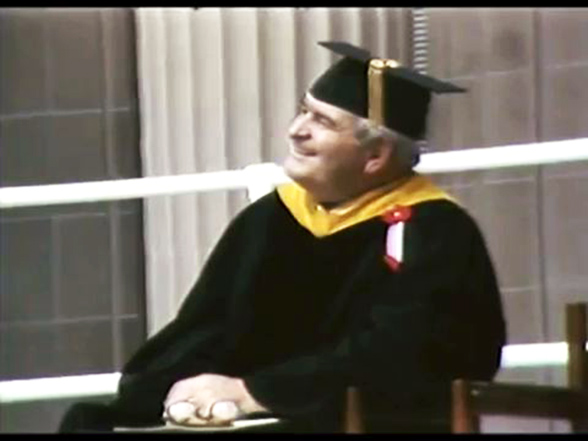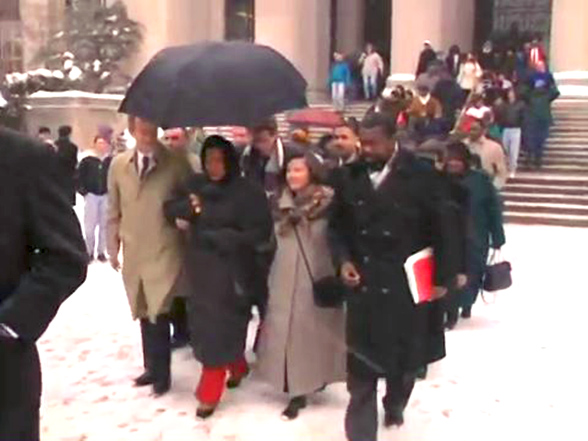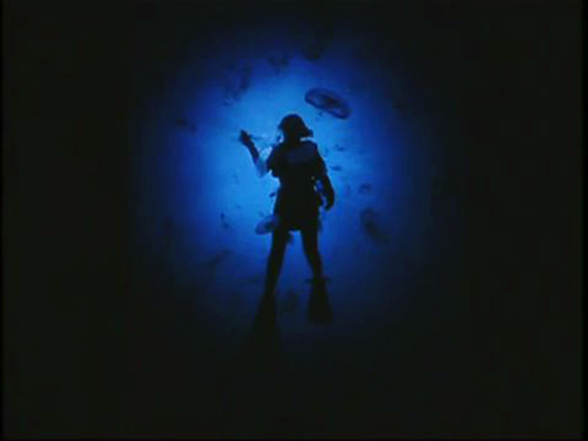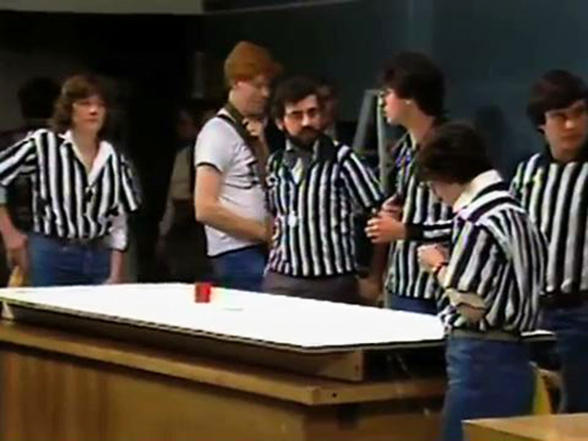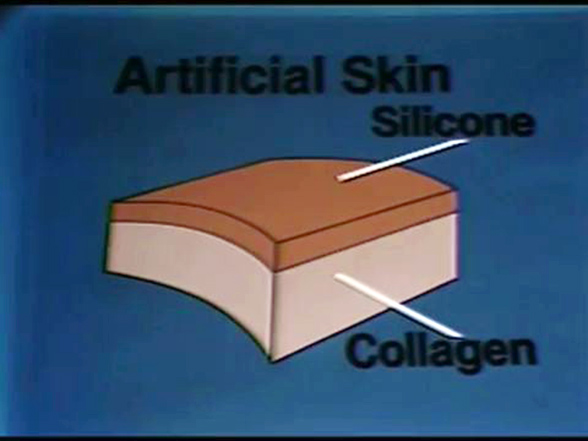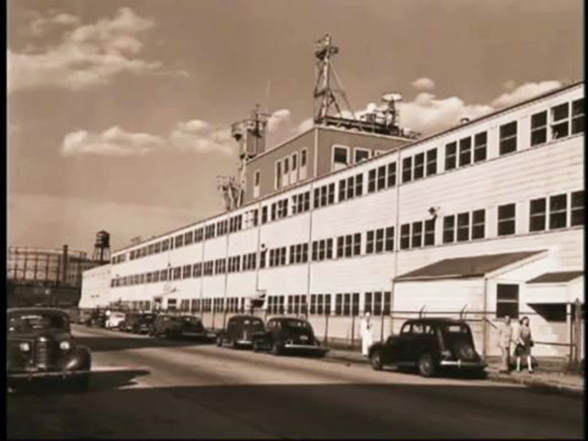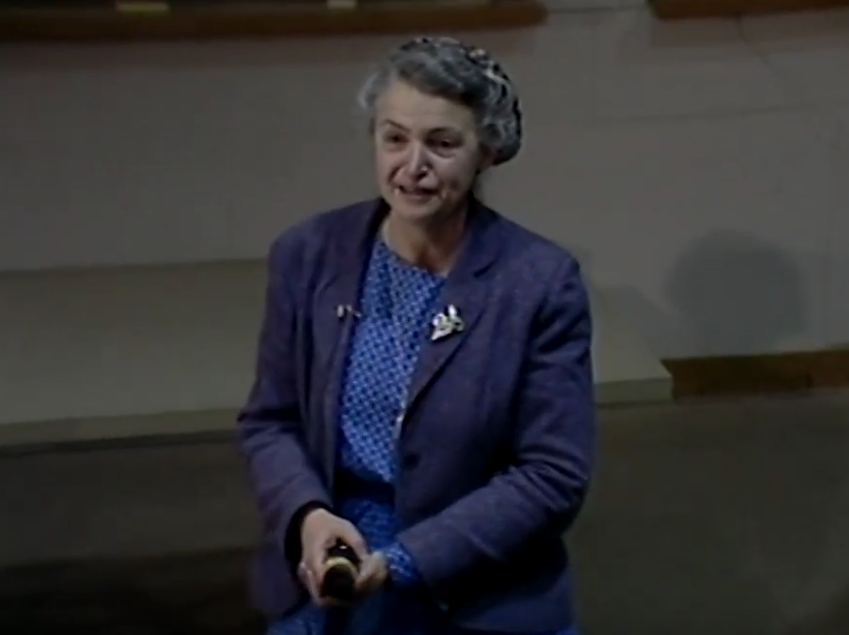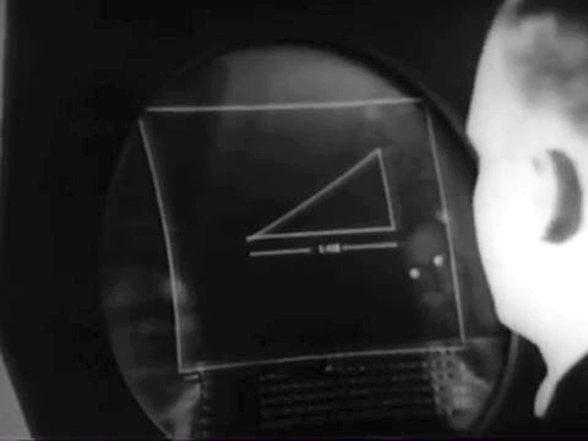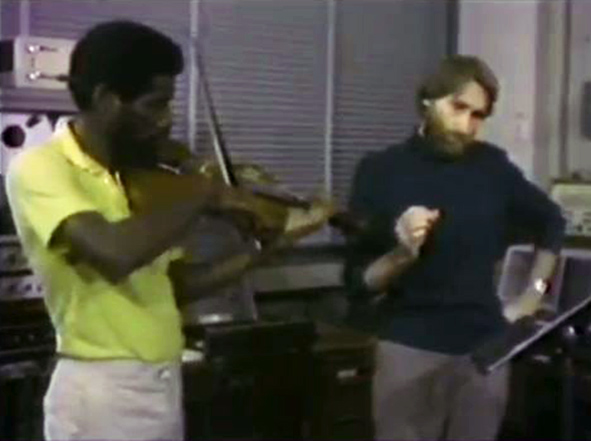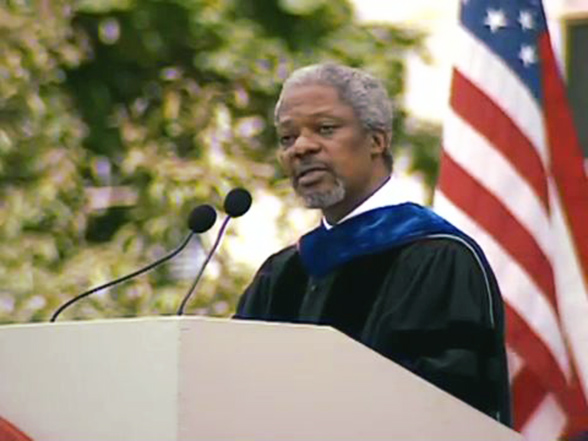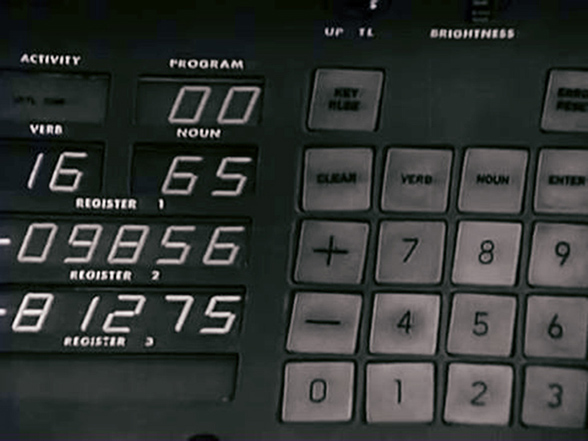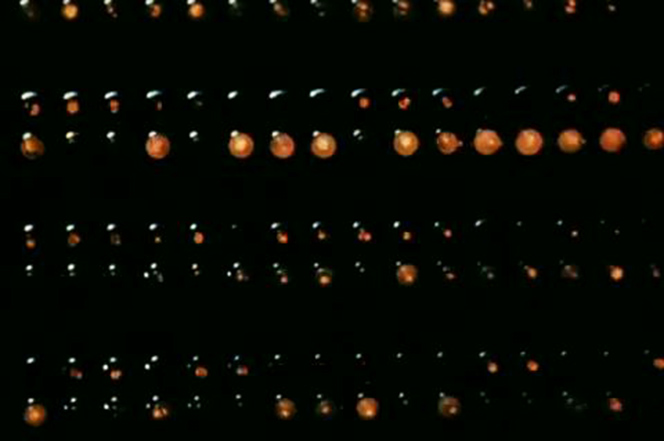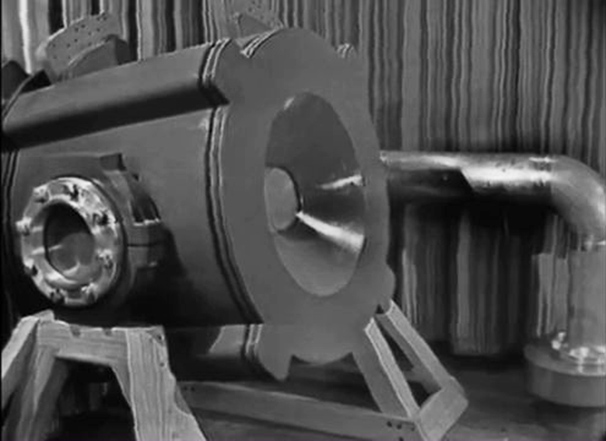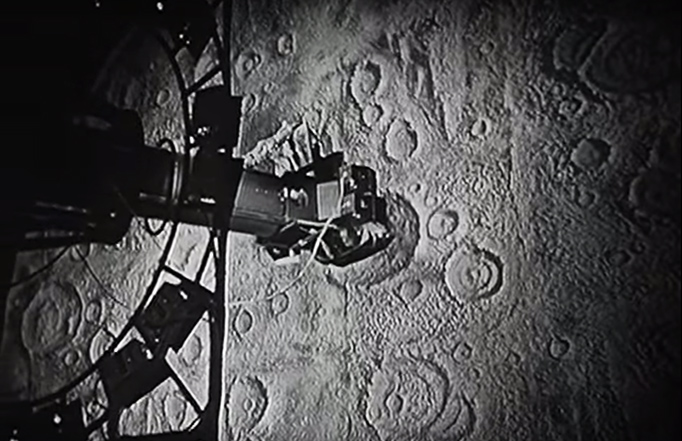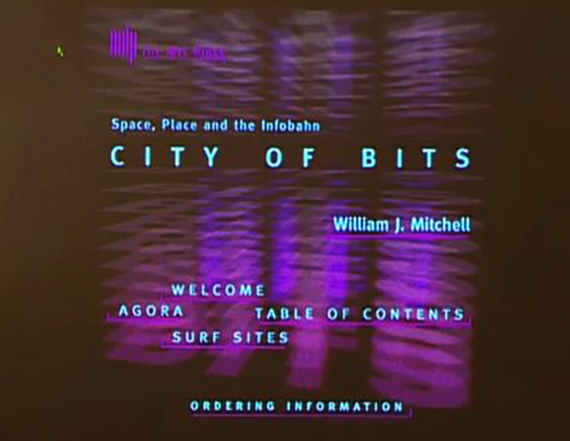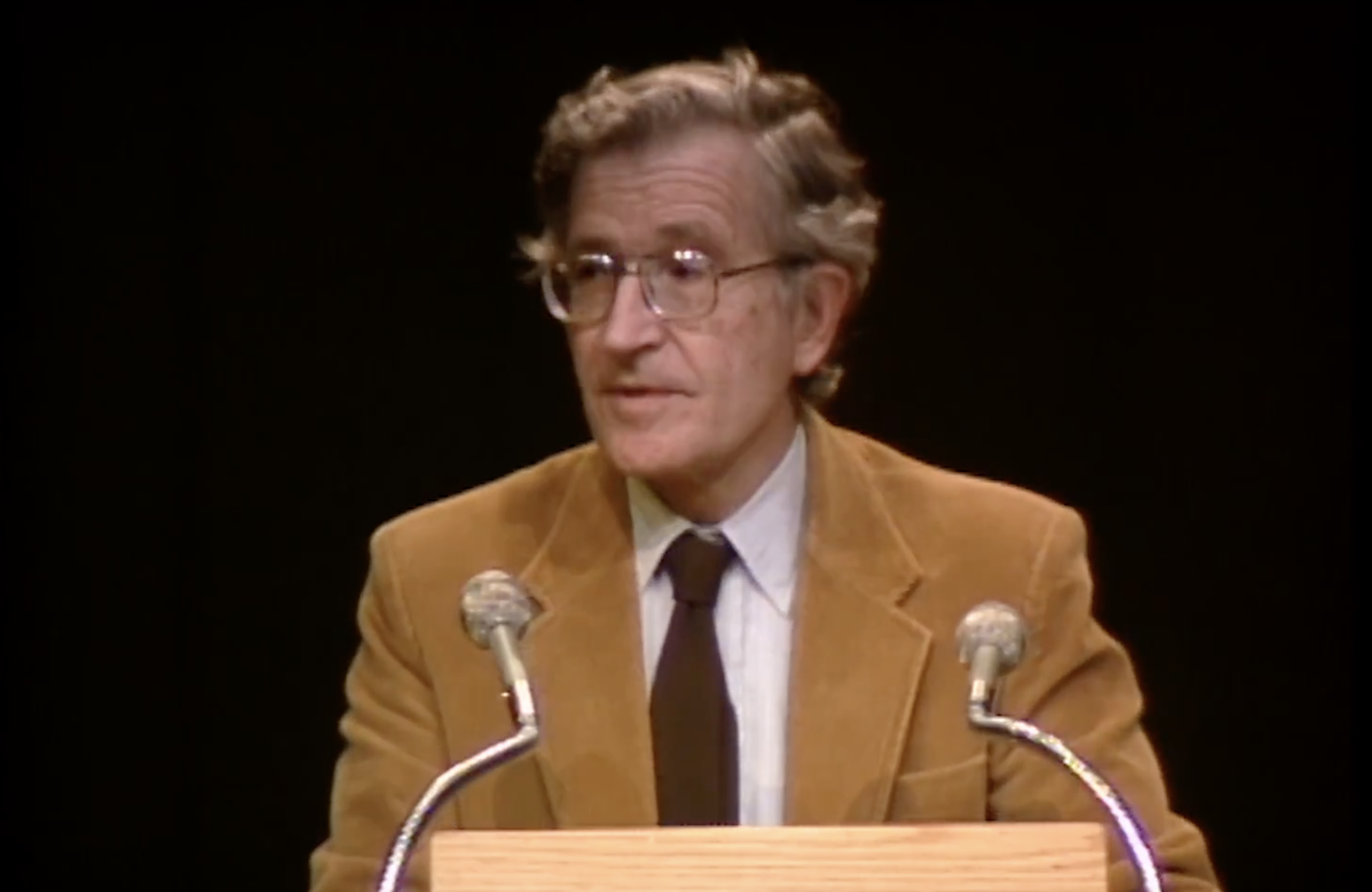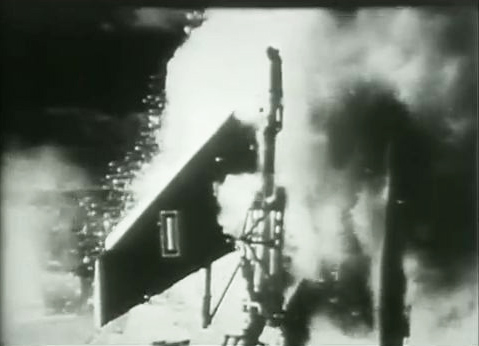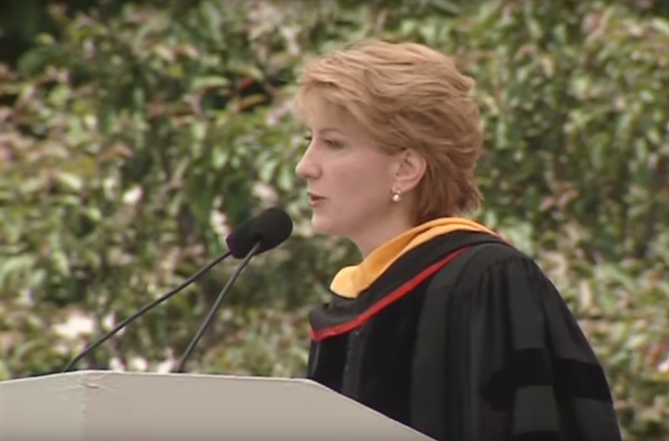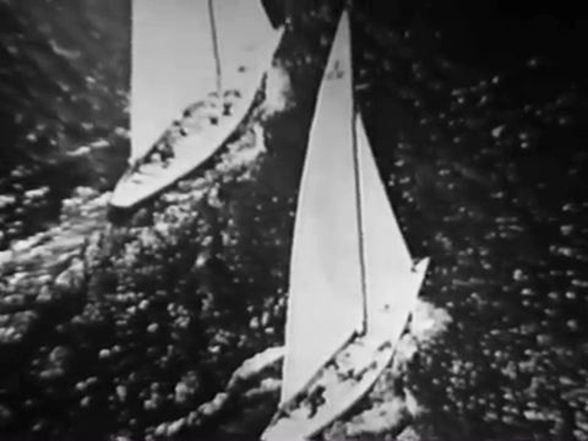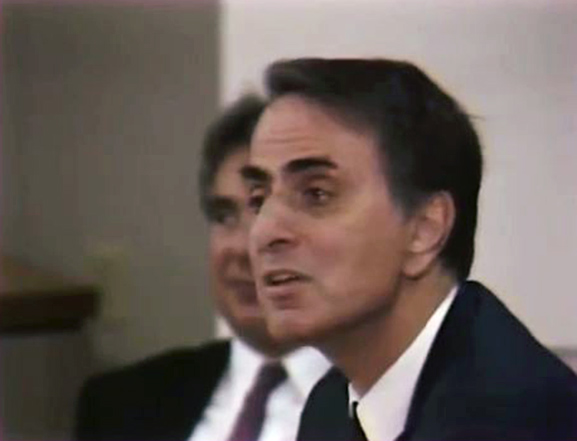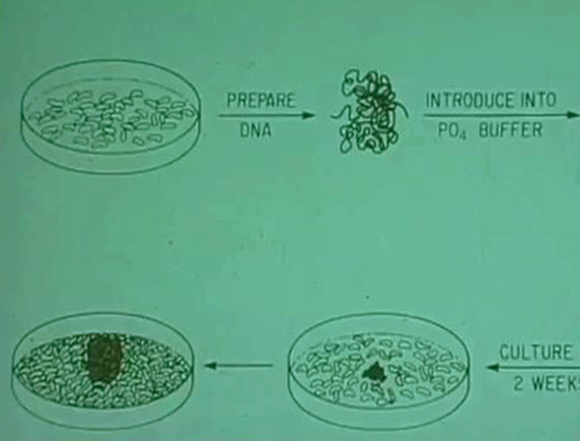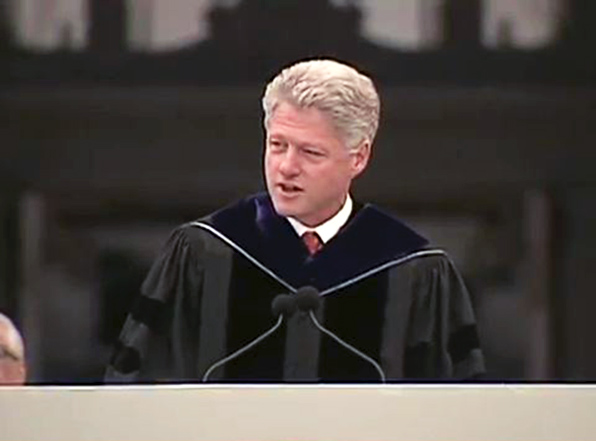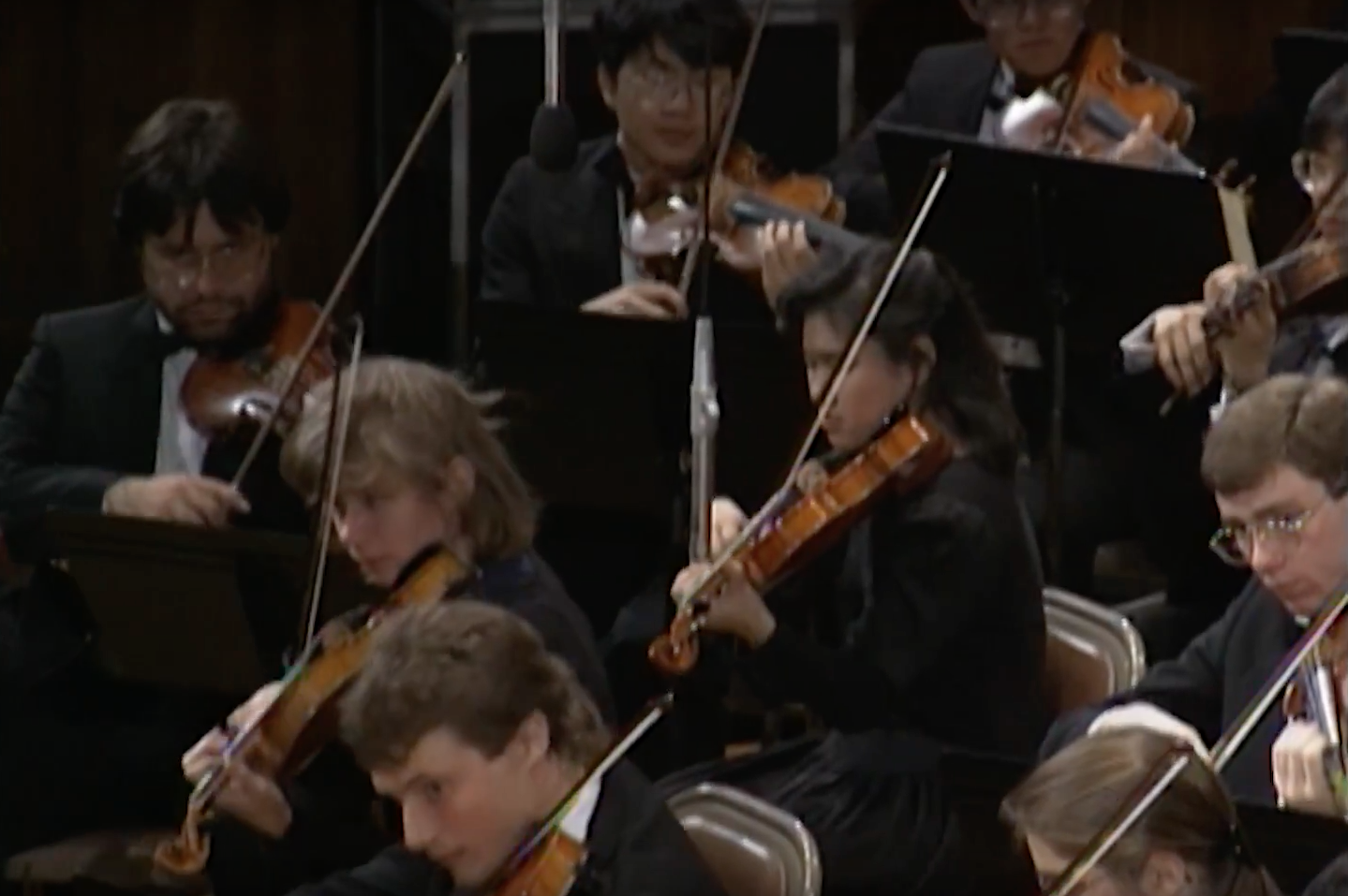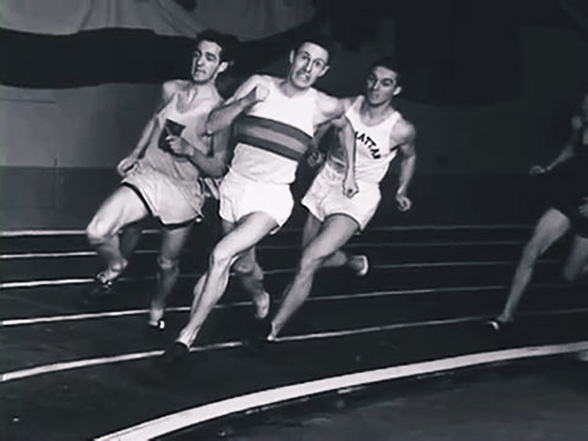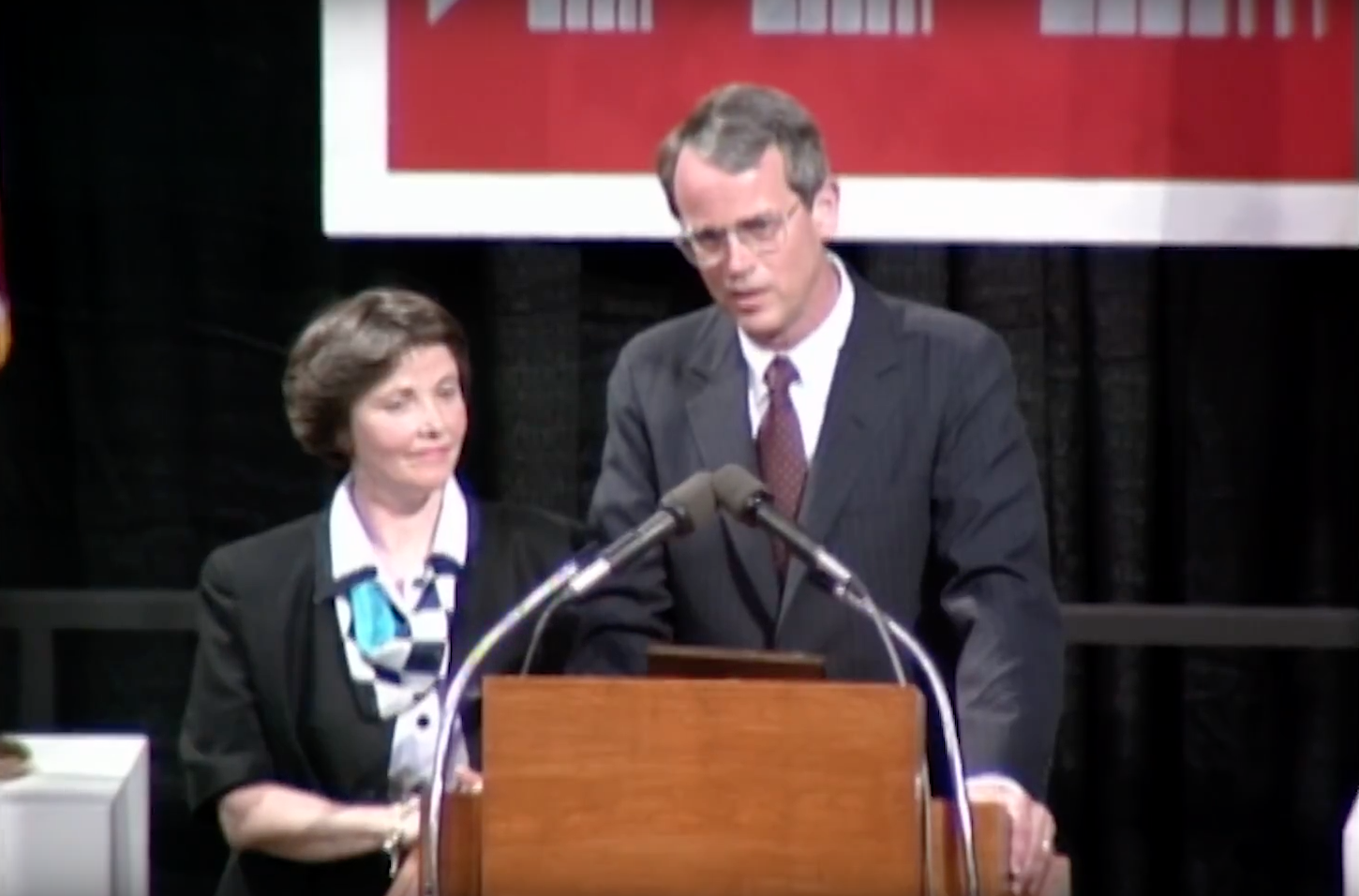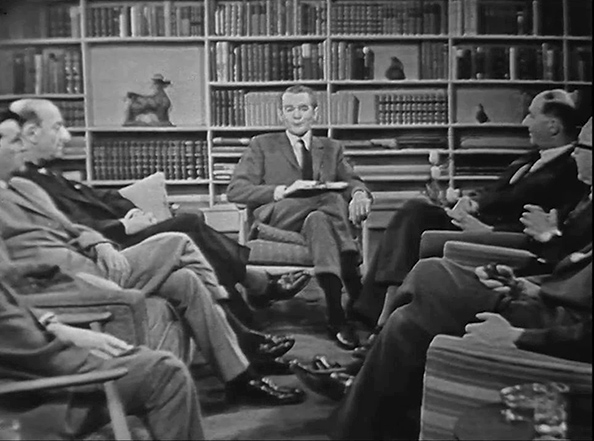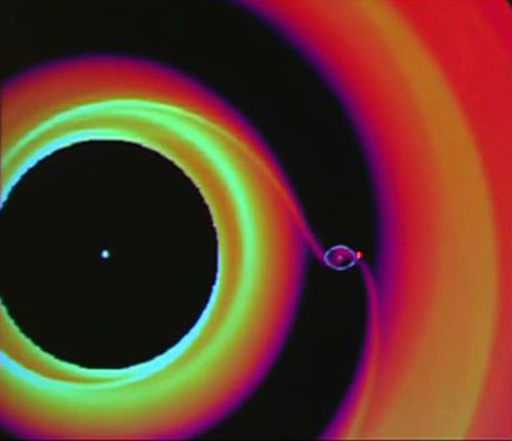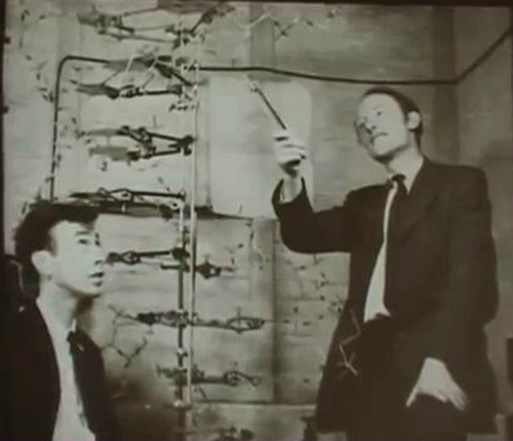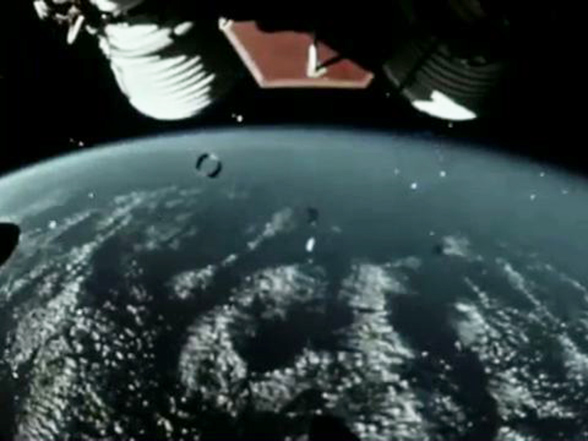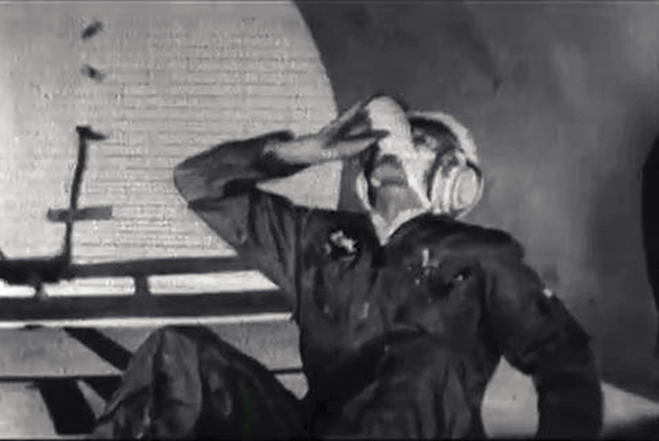Paul E. Gray becomes MIT's 14th President
[MUSIC PLAYING]
WIESNER: Well, I'm sort of speechless today. It's a nice day, but one in which the ex-president is supposed to keep his mouth shut, I think. Don't you?
GRAY: It's very nice to have so many people from so many institutions and so many old friends who have come back today to participate in this celebration.
KILLIAN: It was my privilege 26 years ago to award you your Bachelor's degree, and 25 years ago, your Master's degree. And here I am today still talking-- your ancient kibbutzer, proudly voicing congratulations.
This array of coincidences, in your career and mine, speaks to the fact that as an MIT president, you are uniquely an MIT product. No past Institute president was so completely indigenous, a matter for self congratulation in the MIT community, especially on the part of the faculty.
INTERVIEWER: What do you think was the highlight of all these inaugural festivities?
ATTENDEE: Well, I think the highlight was that the spirit was still the spirit of that first faculty meeting when they found out that Paul was president.
PROFESSOR: Room 10-250, I've never seen so electrified as it was that day when the faculty came in. And everybody knew that Paul-- and Paul marched in with Dr. Wiesner. I've never seen MIT so warm and so, just such a delightful place.
PRESENTER: President and Mrs. Gray, distinguished friends of the Institute, welcome to this inaugural symposium, the first one of the series on information, entitled as you heard, Computers and People, Future Partnership or Conflict?
It is appropriate, I think, to have such a symposium at this time. After all, we're well into the information revolution, the course of which promises to affect, and be affected by, this institution under Paul Gray's presidency.
PRESENTER: I may end with a play on words, because there is, as some of you know, that lovely remark in Faust which he says that, [SPEAKING GERMAN].
"Gray, dear friend, is every theory, and green alone life's golden tree."
We have here a Mr. Gray, who's being put in as the president of MIT. I know that theory will be Gray, but he will make MIT green. Thank you.
PRESENTER: The main thrust of my talk will center on the privacy issue. This, to my mind, is the most immediate social issue raised by computers, more prominent than computer-generated unemployment, and certainly more pressing than questions such as whether we are in danger of becoming computer dominated.
Present day computer capabilities, on the one hand, and existing governmental and private sector information gathering practices, on the other hand, compel us to consider the privacy issue now.
MRS. GRAY: Hi, Jack. How are you? Nice to meet you. Hello. Nice to meet you.
[MUSIC PLAYING]
ATTENDEE: I mean it doesn't get much above the top of the Dreyfus building, but you get a good view of the court and all the activity here.
INTERVIEWER: Do you think this is a good way to begin the inauguration?
GRAY: Indeed, indeed.
[APPLAUSE]
MIT EMPLOYEE: First woman, first woman. Okay.
[APPLAUSE]
GRAY: It's time to announce the results of the race and to honor the winners. The overall winner with the fastest time, Sandra Brown. Sandra, where are you?
[APPLAUSE]
Those are all the winners. I'd like to express my gratitude and thanks to everyone who came and who ran, and to all who came to this party. Thanks very much.
[APPLAUSE]
[SINGING]
Take me back on a special train to the Glorious Institute. I yearn for the inspiration of the Technological toot. I'd shun the quizzical, physical prof, the chapel and all that, but how I'd love to go again on the scientific bat. Hurrah for Technology, 'ology, 'ology, oh. Glorious old Technology, 'ology, 'ology, oh. M-A- S-S- A-C-H- U-S-E- T-T- S- I-N-S- T-I-T-U- T-E-O-F- T-E- C-H-N- O-L-O-G- and Y comes after G. The Massachusetts Institute of Technology. Hey.
[APPLAUSE]
[MARTIAL ARTS SOUNDS]
PRESENTER: The title of this symposium, The Other Energy Crisis, is thus an ironic play on words. There is a biological energy crisis, in the sense that growing numbers of people are simply not getting enough food energy to lead full productive lives.
The limiting factor, with some largely unnecessary exceptions, is not yet food production, but distribution and consumption. Food is produced to meet economic demand, not human need.
And the challenge of meeting human needs requires a degree of distributive justice that, in turn, depends on political, economic, and perhaps, structural changes in societies that are often strongly resisted by power elites.
PRESENTER: To you, sir, I bring greetings from the original Technical University in the United Kingdom. And congratulations on the much greater success of our sister university in the United States. We wish you, sir, as you embark on your new term of office as the 14th President enormous success, both to yourself, and to the Institution. Thank you for inviting me to be present.
Ladies and gentlemen, the subject I've taken for my paper this afternoon is, Oil for Breakfast. And the reason becomes apparent. Virtually all the triumphs of modern agricultural science which has given the developed countries the most varied, the cheapest, the most hygienic diet in recorded history, involve pouring fossil fuel into our food systems to produce more food. As I shall hope to demonstrate, we indeed eat oil for breakfast.
[MUSIC PLAYING]
[APPLAUSE]
[MUSIC PLAYING]
DUHAY: Good morning.
INTERVIEWER: Good morning. What do you think the, what are these numbers for?
DUHAY: I'm not sure. I guess they're the order of the procession, the order of the march.
INTERVIEWER: What's your name?
DUHAY: My name is Frank Duhay. I'm the mayor of Cambridge.
INTERVIEWER: That's right, you are. Well, that's right. Tell us about this inauguration, as far as the city of Cambridge is concerned.
DUHAY: Well, of course, the city of Cambridge is very pleased, and we have decided that the weather will be nice this morning.
ATTENDEE: I think all these people who've arrived from all over the world have come for it, it adds a certain meaning to it, you know, beyond MIT. So, I mean, I think we're all going to have a great time.
INTERVIEWER: What do you think of this very important inaugural--
ATTENDEE: I am very much impressed, very much impressed. Of course, I'm an alumnus, and I'm slightly warped in favor of MIT, but I think this is the best one ever.
INTERVIEWER: Very special--
ATTENDEE: Yeah, and I think that the former presidents would say that. Even--
ATTENDEE: Even the old-- fellows like Cecil Green, and alumni who keep coming back and needling the presidents that make--
ATTENDEE: Why don't you do this? Why don't you do that? Yeah.
ATTENDEE: Cracking the whip.
STRATTON: It's a rare occasion to have so many presidents. And they're not fighting together either.
INTERVIEWER: What do you say? This is your day.
GRAY: It's a delight to be here with this collection of presidents at this institution-- a very happy day.
INTERVIEWER: A lot of people are saying that they are very excited that you're going to be the next president. How do you respond to that?
GRAY: Well, I'm very excited too, Paula. It's a marvelous opportunity and a great responsibility, and a little humbling. A lot humbling.
INTERVIEWER: Are you nervous today?
GRAY: Yes.
MRS. GRAY: It's been an exciting day already and the next hour is going to be unbelievable, I suspect.
INTERVIEWER: Nervous?
CHIEF MARSHAL: Oh, no. I guess I just hope they all follow me.
[MUSIC PLAYING]
GRAY: Well, the thing that's so heartening about this moment is everyone goes by, they say, good luck and best wishes. And they mean it.
And it will take a lot of good luck and a lot of people working together to make MIT move ahead. It's very encouraging.
INTERVIEWER: And did you notice the sun is coming out?
GRAY: Indeed. Just at the right moment.
[MUSIC PLAYING]
JOHNSON: The Corporation and the faculty of the Massachusetts Institute of Technology are now declared convened together with this assembly to join in the inauguration of Paul Edward Gray as 14th President of the Institute.
May I ask you now to again please rise while Virginia Wilson Gray Army offers the invocation.
GRAY ARMY: We are gathered here today to celebrate many gifts. We celebrate with a deep sense of pride and satisfaction the inauguration of the Massachusetts Institute of Technology's 14th President, Paul Edward Gray. And we thank you, not least of all, Lord, for allowing this ceremony to be outside and for the sun to shine on all of us.
JOHNSON: To summarize our feelings, all of our feelings, about Paul Gray, and to salute him on this occasion, I call on the senior former President of MIT, Dr. James R. Killian, Jr., for whom this court was appropriately named in 1974. Dr. Killian.
KILLIAN: You became one of the best liked and most respected teachers in your department. It was soon recognized that your first rate performance as a teacher was matched by first rate talent as an administrator.
And you were quickly co-opted from one administrative job after another. In fact, you hardly had the opportunity to warm the chair in one post before you were drafted for another.
JOHNSON: Paul Edward Gray, by the authority of the Corporation, and with the enthusiastic approval of the faculty, the alumni, and the student body and this distinguished assembly, I present into your keeping the charter of the Massachusetts Institute of Technology, and invest you with all of the authority, privileges, and responsibilities of the office of president.
May you serve the Institute and dignify its office of president with all the skill, wisdom, and dedication which our confidence accords to you. And may your administration be memorable.
[APPLAUSE]
GRAY: Most of my adult life has centered on the surroundings of this magnificent courtyard. The dominant emotions I feel are those of profound respect and humility, for this place expects and deserves uncommon performance from those who are privileged to serve it.
As MIT enters a new decade, it takes its place in a world whose prospects for peace and justice are uncertain, a world in which economic security, literacy, and health are not enjoyed by most people. With all our progress, poverty is still the only prospect, and hunger a condition of life for a shockingly large portion of the world's people.
Here in the United States, in the midst of a presidential election year, there is a widely shared sense that many of the old values and old ways are not appropriate somehow to these times. And yet, change requires leadership from MIT.
It is our responsibility to help develop the full range of talent and potential in our society. MIT has a responsibility to itself, and to the nation, to be open, and indeed, to reach out to the most talented and promising people regardless of race or sex.
We must preserve our unswerving commitment to the quality and vigor of our core activities and engineering and science. We must do so in ways that respect the integrity of basic science, in ways that uphold the values of applied science and technology, and in ways that reflect and engage the social context in which science and technology occur.
We continue to hear the complaint that the world has had too much of science and technology, that many of our human and social ills are the direct result of unanticipated and deleterious artifacts of technology foisted upon the world by technicians with tunnel vision.
Ultimately, I believe this inquiry and these enterprises must rest where they begin-- with concern for the human condition. We must continue to be a sanctuary for the constructive criticism of the technological enterprise and of the larger society.
These principles must be built into the academic programs of our students, both undergraduate and graduate. We have a responsibility to educate our students for civilized leadership as professionals and citizens of the world.
Thank you very much. From the heart, I thank you.
PHOTOGRAPHER: Look over here. One more. Anybody else in the graduating class in the '40s?
MIT ALUMNI: Yes.
PHOTOGRAPHER: Right over here.
MIT ALUMNI: Who would even admit it?
PHOTOGRAPHER: Okay, if you can look right over here.
PHOTOGRAPHER: One more.
MIT ALUMNI: Hasselblad.
PHOTOGRAPHER: Hasselblad. Victor Hasselblad. He makes a lot of money.
PHOTOGRAPHER: Can you look right here? Thank you.
PHOTOGRAPHER: Okay, thank you very much.
PHOTOGRAPHER: Okay, if everybody make sure they can see the lens.
MIT ALUMNI: Any film in this camera?
PHOTOGRAPHER: Oh, yeah. Okay, ready? You can look right this way. And just one more.
[LAUGHTER]
MODERATOR: Ladies and gentlemen, it is a privilege for me to call upon Derek C. Bok, president of Harvard University.
[APPLAUSE]
BOK: As a neighbor, I look forward to a continuing and close cooperation with this glorious institution. As a university president, I look forward to hearing a strong, new voice for science and for academic research. But most of all, as a citizen, I look forward to a source of enlightenment to guide us in the wise development and use of scientific knowledge.
And so, as you begin your term, Paul, you have our respect, our hopes, and our warmest good wishes.
GRAY: Thank you very much.
[APPLAUSE]
BAKER: This is about my Uncle Harold. Uncle Harold was famous for lying. He had once been shot right between the eyes. He told me so himself.
It was during World War I. An underage boy, he had run away from home, enlisted in the United States Marine Corps, and then shipped to France, where one of the Kaiser's soldiers had shot him right between the eyes.
It was a miracle it hadn't killed him, and I said so the evening he told me about it. He explained that Marines were so hardy, they didn't need miracles.
What I like to recollect is that he could remember being born.
[LAUGHTER]
He told me about it one night.
[LAUGHTER]
He could remember the very instant of birth. His mother was pleased, and the doctor who delivered him-- Uncle Harold could remember this distinctly-- said, it's a boy.
There were several people in the room, and they all smiled at him. He could remember their faces vividly, and he smiled back. Thank you.
[APPLAUSE]
[MUSIC PLAYING]
INTERVIEWER: Now, Dr. Gray, weren't you just a little tired this morning?
GRAY: No, I'm still on adrenaline
INTERVIEWER: Who do you think was the highlight of the inaugural activity?
ATTENDEE: The highlight of the inaugural activity was the inauguration speech. It was superb. It's just the kind of note that should be struck, and I'm delighted he struck it.
GRAY: Well, I'd be reluctant to say what was the highlight until we sample this.
[MUSIC PLAYING]
INTERVIEWER: What did you think of the inauguration?
MIT EMPLOYEE: What did I think of it? Was beautiful.
INTERVIEWER: Do you think it was worth all the effort?
MIT EMPLOYEE: Certainly was.
INTERVIEWER: What'd you think?
MIT EMPLOYEE: Very nice. Very nice. Glad the sun came out.
INTERVIEWER: Did you have any major problems?
MIT EMPLOYEE: No, nothing.
MIT EMPLOYEE: Was one, parking lot.
MIT EMPLOYEE: Everything worked fine.
INTERVIEWER: What do you have to do now? And how long will it take you to dismantle this whole thing?
MIT EMPLOYEE: Oh, a day. A day or two. John, talk, will ya?
MIT EMPLOYEE: I'm busy up here getting the leg off. OK.
